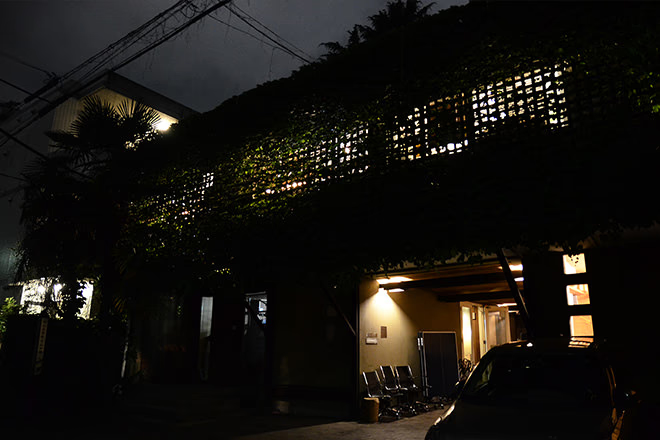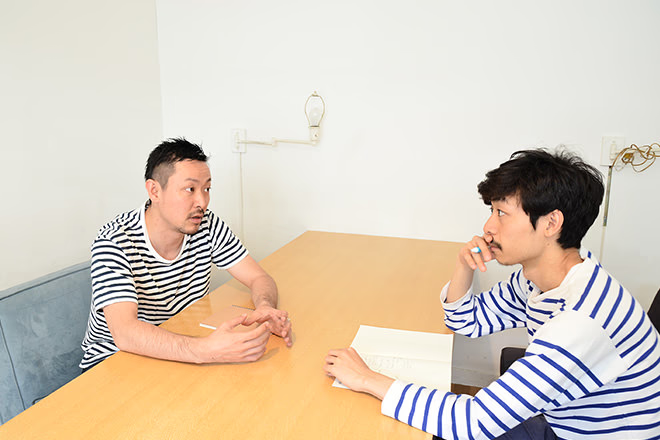(名)スル
① 物の機能を生かして用いること。活用。
② 金銭を利殖などの目的のために他の財産形態に変えること。
③ 運転。特に、操船。
〔大辞林 第三版〕
モノサス運用チームの仕事部屋は、建物を正面から見て、手前の棟の左側2Fにある。
朝早くから来て仕事をしている人は見受けられず、夜帰るときにはどの部署より煌々と明かりが灯っている。

チームのメンバーはリーダー1人、班長3人、班員8人の計12人。
大まかではあるが、ディレクション/デザイン/コーディングで班が分かれている。
男女比は2:1。
もともとweb制作に携わっていた人もいれば、グラフィックデザインを生業としていた人、制作の経験自体がなかった人など、バックグラウンドは様々である。
そんな運用チームに入社して半年。
Web業界未経験だった自分は、右も左もわからないなりに、大量に襲いかかってくる案件の波を軽やかに、時に大きな傷を負いながらこなしてきた。
半年前に「運用チームの一員として、よろしくお願いします」とリーダーの栗原に言われ、
なにをするのかさっぱり思い浮かばなかった自分。
とはいえ、いま「運用ってなにしてるの?」
という質問をされても、短い言葉で正確な解答をするのは難しい。
案件ごと、クライアントごとに、求められるレベルや内容は様々だからである。
それでも、半年という区切りの良いタイミングに、そしてまだ若手であるうちに、
「運用とは」「運用チームとは」という部分の理解をもっと深めたい。
運用の本質的な部分にもっと近づいて仕事をしたい。
そんな思いから、運用チームに関わる方々にインタビューすることに決めた。
第1回目の今回は、運用チームリーダーで、ディレクターの栗原功に話を聞いた。
建物の奥の棟2Fにある小会議室で、栗原を待っていると、階段を走って上ってくる大きな音が聞こえてくる。
そして、すぐにドアが開く。
「遅れてごめんなさい。」
―いえいえ、とんでもないです。こちらこそ、今日はよろしくお願いします。
運用は窮屈?
―早速ですが、運用チームは立ち上げからどれくらいなんでしょうか。
「結構ややこしいのですが、チームとして立ち上がったのは2年前です。」
―ややこしいというのは?
「“クリエイティブ部運用チーム”が立ち上がる前は、新規案件もリニューアル案件も運用案件も、“クリエイティブ事業部”という部署で一括で受けていました。そこに自分が入社して、しばらくしてから運用案件管理担当になったのがはじまりです。
そのときはまだチーム化していなかったのですが、徐々に案件が増え、事業部内で運用案件担当と新規案件担当で分かれ始めました。
その後、「チーム化しましょう」となったのが2年前です。」

―そもそも「運用」と「新規」の違いってなんでしょうか。
「違うところはたくさんありますが、どこから制作に入るかというのが一番大きい違いですね。
新規制作だったら、「どういうサイトを作りましょうか」と、プランニングから考えて、全体のデザインのトーン&マナーも考えます。
つまり、お客さんの意図を汲みながら、0から考えて提案できます。
一方で運用は、出来上がったサイトがすでにあります。
すでにあるサイトの枠の中で、デザインやコーディングを進めないといけません。」
―窮屈そうに聞こえますが(笑)、そのなかで栗原さんが感じる運用の魅力はどこでしょうか。
「初めは自分も窮屈に感じていましたね。
でも業務をすすめていくうちに、考えが変わっていきました。
魅力のひとつは、同じお客さんと同じサイトに長く携わるので、お客さんのやっていきたいこと、伝えていきたいことを深く理解した上で仕事ができることです。
お客さんの依頼には必ず目的があります。
依頼にいたるまでの経緯を知っているか、知らないかで、目的への理解度の深さや理解するまでの速度が全然違うと考えています。
自分たちとしても、目的や意味を深く理解した方が楽しいですし、そうすることで提案もしやすくなります。
「そうそう、それそれ!!」って言ってもらえたら素直にうれしいですね。
他には、運用を行うことで、サイトに対して広い範囲で携わることができます。
たとえば、デザインやコーディングだけでなく、売上アップのための改善提案とか。
お客さんの先にいる人の“反応”を継続して見ながら、次の対応をお客さんに提案できるというのは運用の醍醐味です。
メルマガを作って、何人が開封したのか。
新規ページを作って、何人の人が入ってきて、どういう風に動いているのか。
新規制作のみの場合も見ることはできますが、継続して提案できるという部分は運用ならではだと思います。」
全員ディレクター主義、全員営業主義
―Web業界未経験で今のチームに入った僕からすると、新規立ち上げの方の仕事をつかみきれていない部分があります。
運用しかやったことのない人が新規しかやったことのない人と比べたときの強みはありますか?
「“営業感覚”は強みだと思います。
運用案件のディレクターは窓口でもあり、営業でもあると思って仕事をしています。
個々の案件は突発で入ってくることが当たり前ですから、スケジューリングしても、スケジュール通りにいきません。
他の人から、「それって、今やらなきゃいけないの?」と見えることもあります。
でもお客さんからしたら、依頼を出してすぐに対応するって、すごく満足度が上がると思うんです。
スケジュールを飛び越え、そこに応えていくことで、お客さんと自然に人間関係を作っていけるのかなと。」

―入社するときに、「1人1案件は絶対ディレクションしてもらいます」と言われたのを覚えています。運用に関していえば、「ただ制作していればいい」ということではないと?
「そうですね、それはずっと思っています。
ディレションだけする人が入って、別の人に制作の指示をを出すよりも、制作する人がディレクションも兼ねたら、指示や管理する時間を省けますよね?即時対応を求められる運用チームでは、ディレクションの能力は必須です。
そして、運用は守備範囲が広くないといけない。
クライアントに「こういうことやってほしいです」って言われたら、その主担当の人が考える。
デザインであっても、コーディングであってもです。
“そのためにどうしたらいいか”を考えて、行動することが求められます。」
―通常の制作だったら、一人ひとつの役割がかっちり決まっているということですか?
「新規制作もディレクターがワイヤーを引いたり、ライティングをしたり、幅広くやらなきゃいけないときもあるとは思います。
でも運用は、その中でも振り幅が広いというか。
“スキルとして色んなことに対応できるようになる、経験できる”のは強みだと思いますね。
コーディングをやっている横で、「じゃあ明日企画書書いて」など、通常の制作ではあまりない振り幅で仕事をしてもらっています。」

ハイブリッドなスキルは専門性に匹敵する
―強い部分として、「営業感覚」「色んなことに対応できるスキル」が出ました。逆に弱いと感じる部分は?
「“技術的な伸びしろ”が、案件ではあまり積めないのかもしれません。
案件として入ってくる大部分は、もう決まったサイトに対してのページ制作ですから。
もし1案件しかやっていない人がいるとすれば、その案件のやり方しか知らないことになります。」
―さきほど出た強みのひとつである「色んなことに対応できる」というのは裏を返せば、「ひとつの技術の専門性」みたいのは弱い部分ってことでしょうか。
「そうですね。
運用で必要とされるのは、どちらかといえば“広く浅く”というところがありますしね。」
―“広く浅く”というのは、制作業界だと軽視されがちな考え方という印象があります。それに対して、思うことはありますか?
「モノサスの運用チームでは、1案件に慣れたら他の案件にも関わってもらい、スキルの幅を広げてもらいます。
様々な案件で経験したことは、必ずその人の力になります。
最近の運用案件は企画やデザインなどの上流工程の依頼も多いですから、本人のやる気次第でそういった仕事の経験も積んでもらいます。
また、運用をきっかけに新規案件の依頼をいただくことも増えてきました。
現在の運用チームは、運用だけでなく、新規制作やリニューアルの要望にも応えられるチームになってきています。
“ひとつの技術の専門性”ももちろん強みですが、色んな技術やスキルを“ハイブリッド”してお客さんの依頼に柔軟に対応できることも専門性と同じくらい強い武器だと思っています。」
熟年夫婦のような関係が理想
―現場のリーダーが考える「運用」についてお話を伺ってきたわけですが、「こういう風に運用をやっていきたい」という部分を伺ってもいいでしょうか。
「今は指示書をいただいて作業をしていますが、指示書をもらわずに作業に入れるようにしていきたいですね。
理想としては、お客さんとは何も話さずにこれからやるべきことを理解できる、“熟年夫婦”みたいな関係が作れたらいいなって(笑)
そこまでやるということは、もっとお客さんのことを知らないといけないわけですし、知りたいですね。
なんというか、お客さんの一部ではなくて、全部にかかわりたい。
それがモノサスの運用チームが目指す運用です。
その上で、お客さんが困ったときに思い浮かぶのがモノサスの運用チームであってほしいと思います。」
―これから入ってくる人に求めたいことはありますか?
「『この仕事をやる』という限定的な決め付けをしないで入ってきてほしいです。なんだってやりますよ。」

